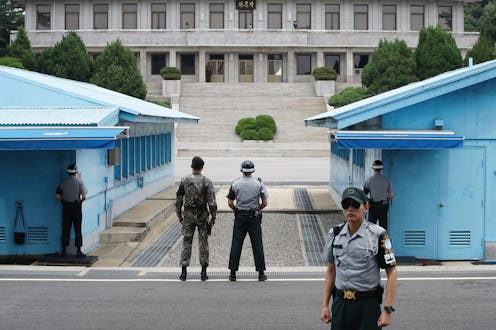News
Some People Think North Korea Is Developing Anthrax — Here's Why

The threat of nuclear weapons and intercontinental ballistic missiles has seen the world worried about North Korea. Now it seems the government of Kim Jong-un may be developing biological weapons too: A North Korean defector tested positive for exposure to anthrax, the bioweapon made famous in the United States during the 2001 mail attacks.
An intelligence official told South Korean TV network Channel A that one of the soldiers who defected this year — there have been at least four in 2017 — had anthrax antibodies in his blood. "Anthrax antibodies have been found in the North Korean defector who has escaped this year," the official said in the report that aired on Tuesday in the South.
That has led analysts to wonder about the possible intentional development of the bioweapon by the North. It is believed that vaccinations against the bacteria have been given to both high-level officials and the lower-level soldiers who could be handling the bacteria, and that the country is exploring deploying it on ICBMs. The question then is whether the defector was vaccinated, or whether he was accidentally exposed.
Meanwhile, the South has been trying to investigate what level of stockpiles the North might have developed, while denying that their own leaders, like President Moon Jae-in, were vaccinated. The South has bought 1,000 doses of anthrax vaccines to be given to counterterrorism officials.
Neither South Korea's National Intelligence Service nor the Defense Ministry confirmed the reports to CNN, but the Trump National Security Strategy claimed that the North "has spent hundreds of millions of dollars on nuclear, chemical, and biological weapons" and suggested the North's research included "pursuing chemical and biological weapons which could also be delivered by missile." According to USA Today, Japanese newspaper Asahi Shimbun reported that the North is researching whether the anthrax spores would survive the heat of reentering the atmosphere on an ICBM.
Anthrax is a biological weapon based on the bacteria Bacillus anthracis. You do not need to be the target of a terrorist or military attack to come down with the anthrax illness. Although rare, the Centers for Disease Control website explains that exposure to infected animals or animal products can be the cause. The severity of the illness, though, depends on how the bacteria enters your body. It can be extremely serious and require hospitalization. If not treated, it can result in death.
North Korea has denied the claims that it is developing anthrax or any other biological weapon. The North "maintains its consistent stand to oppose development, manufacture, stockpiling and possession of biological weapons," a statement from the government read, noting that the state is a signatory of the Biological Weapons Convention.
This denial would be more plausible if it weren't for the use of VX nerve agent in the February assassination of Kim Jong-nam, Kim Jong-un's half brother, at Kuala Lumpur International Airport. Two women came up to him and wiped the nerve agent on his face. Kim Jong-nam was prepared for such an attack, having hadthe antidote with him in his bag.
Although an attack is highly unlikely, the news comes just weeks before South Korea hosts the 2018 Winter Olympics, a time when the world will be watching the Korean peninsula.
Just last week the North was made subject to another round of U.N. sanctions for its nuclear program, which even its closest ally China supported; the sanctions are targeting oil, gas, and diesel, as well as machinery and industrial metals. Then, on Tuesday, the United States put more sanctions on two officials who are seen as key to the weapons program.
If more proof of bioweapons comes out, even more sanctions could be called for.